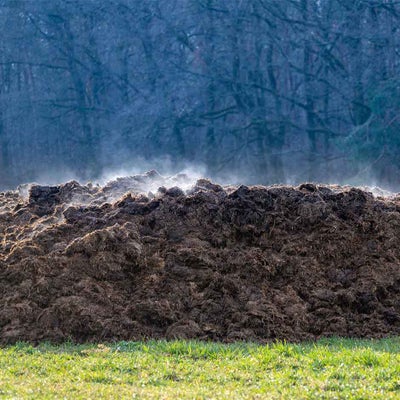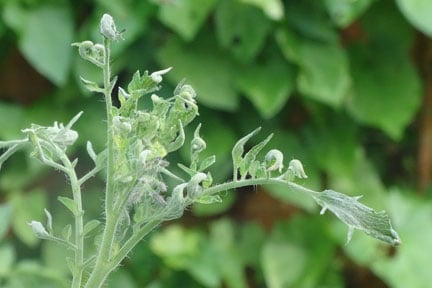
Quick facts
Plants grown using contaminated manure often have cupped leaves, fern-like growth and pale, narrow and distorted shoot tips
Manure can be contaminated by some selective hormonal weedkillers that are applied to grassland and used for animal feed
The chemical aminopyralid, found in agricultural products, is responsible for most incidents of weedkiller contamination in manure
A different chemical called clopyralid, which is found in some lawn weedkillers as well as agricultural products, has been involved in similar incidents
It can take over a year for residues of these weedkillers to break down in manures
Why is weedkiller found in manure?
Hormonal weedkillers, including aminopyralid and clopyralid, are used to kill broad-leaved weeds on agricultural grassland and other areas. They are applied to grassland where livestock graze, and to grass used as hay or silage to feed horses and ‘housed’ cattle. Aminopyralid and clopyralid bind strongly to plant material, so when the crop is eaten it passes through the animal without breaking down.
The levels of chemical residues in manure from animals fed on treated hay and silage is sufficient to damage many susceptible broad-leaved plants. The weedkiller is broken down by soil bacteria, but it may take a year, or possibly longer, for manure used as a or to be free from contamination.
Bedding materials, such as straw, are less likely to be affected as aminopyralid does not currently have approval for use on cereal crops from which they are made.
What are the effects of using contaminated manure?
Some plants are particularly susceptible to the effects of hormonal weedkillers and damage tends to be more evident on edible crops such as potatoes, chillies, tomatoes, beans and peas. Susceptible ornamental plants include phlox, delphiniums and roses.
Symptoms of hormonal weedkiller contamination include:
- Stunted growth
- Curled and cupped leaves
- Pale, narrow and distorted shoot tips
- Prominent vein markings on the leaves
If you suspect you bought manure or contaminated with weedkiller, do a simple test to confirm it. Our page on weedkiller damage has a step-by-step guide to carrying out a test.
Bear in mind, composted grass clippings treated with selective hormonal lawn weedkillers containing clopyralid, can cause similar effects to manure containing aminopyralid.


What to do if you have used manure contaminated with weedkiller
Using contaminated manure, or containing contaminated manure, around your plants can cause significant damage and plant death. However, the Health and Safety Executive (HSE) has investigated the risk to human health and concluded that produce from affected land is safe to eat.
Gardeners are encouraged to report incidents involving weedkiller contamination in manure. This can be done directly to the manufacturer or supplier of the manure, the HSE incident reporting page and/or Corteva (the manufacturers of clopyralid and aminopyralid).
There are a few ways to mitigate the damaging effects of contaminated manure:
- Speed up the breakdown of weedkiller residue by soil bacteria. Where manure has been added to soil, rotovate or dig over the soil several times, preferably between summer and autumn when the soil is at its warmest. Concentrate on mixing-in pockets of manure, like those found at the bottom of manure-lined trenches. Fully incorporating the manure can result in the ground being safe to replant with susceptible plants in less than a year. Carry out a germination test to check for remaining residue.
- Rake up and remove any loose manure used as a mulch around plants. Do this as soon as you become aware of weedkiller contamination.
- Boost recovery of damaged plants by ensuring they are well looked after. Water during dry spells and feed in spring or early summer. Trees and shrubs have a good chance of surviving. Established plants can also recover.
Disposing of contaminated manure
Unfortunately, residues in piles or stacks of manure can persist for two years or more. If possible, return the unused manure to the supplier. If this is not feasible, contaminated manure can be lightly spread on grassland or lawns. If you have the space, long term storage is an option, but the manure must be fully rotted down and ideally left for several years before use. Even after several years, it is advisable to carry out a test before use.
Contaminated manure or weedkiller damaged plants should not be added to your home compost bin/heap and council collection bins. To find out ways to get rid of contaminated compost and plant material, contact your local authority’s waste disposal department.
How to avoid weedkiller contaminated manure
Measures have been taken to reduce the risk of contaminated manure becoming available to gardeners. However, gardeners should still be cautious about accepting manure from sources that cannot give assurances that the manure has not come from animals fed on grass or feed (‘forage’) treated with persistent hormonal weedkillers, especially aminopyralid. The names of professional plant protection products containing aminopyralid can be found on the HSE website.
If a reliable source of manure is not available, try using an alternative source of organic matter, such as garden compost, leafmould or composted .






